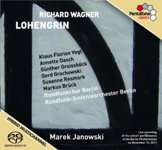|
Back
07/24/2012
Richard Wagner: Lohengrin
Klaus Florian Vogt (Lohengrin), Annette Dasch (Elsa von Brabant), Günther Groissböck (Heinrich der Vogler), Gerd Grochowski (Friedrich von Telramund), Susanne Resmark (Ortrud), Markus Brück (The King’s Herald), Robert Franke, Holger Marks, Sascha Glintenkamp, Thomas Pfützner (Four Brabantian Nobles), Christine Bischoff, Isabelle Vosskühler, Judith Löser, Bettina Pieck (Four Pages), Rundfunkchor Berlin, Eberhard Friedrich (Chorus Master), Rundfunk-Sinfonieorchester Berlin, Marek Janowski (Conductor) Recorded live at the Berlin Philharmonie, Germany (12 November, 2011) – 200’34
Pentatone PTC 5186 403 – Booklet with essays in German, English and French, texts and translations in German and English

   
There may be no more important a label to SA-CD than Pentatone. As an early proponent of the format, they have been among the most consistent in releasing new recordings on the high-resolution discs. Thankfully, they don’t appear to be slowing down. Their website considerately lists their forthcoming releases for the rest of the year, including two companion recordings to this one. As part of their 10th anniversary celebration, Pentatone is recording the ten major Wagner operas including Der Ring des Nibelungen. The project will be finished by the middle of next year. It is an ambitious undertaking to be sure, particularly given the lack of complete operas being recorded in the industry today. These recordings are being taken from live concert performances put on by the Radio Symphony Orchestra of Berlin.
On the whole, the results appear to be very compelling. The recorded sound is a joy and the performance is gripping and vibrant. Lohengrin, as much as any of Wagner’s operas, benefits from an overtly lyrical reading which Maestro Janowski successfully achieves here. The overture begins with a lush but lean sound, and as the score is expanded, the soundstage becomes vibrantly alive. Janowski is a fine leader and sensitive accompanist, keeping the forces in check when necessary. Nowhere is this more important than when it comes to the lead role. Klaus Florian Vogt is famous for these Wagner roles, but his performance here will not be to everyone’s taste. His is a unique, angelic sound; his technique is steady, yet the dynamism of his voice leaves something to be desired. While the clarity of Vogt’s sound often serves the role well, the lacking weight in his middle and lower voice leaves the listener wanting. His entrance in the first act is appropriately mysterious and other-worldly, but the ensuing duel scene lacks authority and leverage. Likewise in Act III, Vogt’s singing in the wedding night scene contains some strikingly beautiful phrases, however his “In Fernem Land” never quite satisfies as it approaches its declamatory conclusion. Only the following “O Elsa! was hast du mir angetan!” gives a glimpse of the dense Heldentenor sound often associated with this role. Finally, the unhinged passion and strength of the Knight appear to break through, but it is too late, for the most part.
Annette Dasch is a satisfying Elsa. Hers is a voice of considerable weight that serves the role well, particularly in the final act. She conveys Elsa’s cascading lines of vulnerable pleading with impressive legato. Her singing here is irresistible. Less successful is the first act singing of shorter phrases where she has a tendency to ease into the disconnected high notes. It appears to be idiosyncratic and predictable, unfortunately, but it is safe to say that she is the standout of the recording, vocally. Dramatically, she is vulnerable when required, but determined and mature as her character evolves. All told, it is a fine portrayal.
The supporting roles are all very well sung. Gerd Grochowski sings Telramund with a honeyed baritone and menacing character that recalls Dietrich Fischer-Dieskau’s rare recorded portrayals of operatic villains. Günther Groissböck’s sonorous King is noble and virile, welcomingly lacking in wobble or age. Both singers are a fine bit of casting, solid in their portrayals, and with contrasting voices that differentiate the roles and motives. Susanne Resmark’s Ortrud is mesmerizingly sung. At the highest points, her voice sounds occasionally stressed, but it is resonant and devious. Resmark’s dramatic commitment is tangible and her vocal resources admirably serve the role well, particularly in her cunning betrayal of Elsa in the second act.
Finally, it is this orchestra and partnering chorus that are the stars and strength of this recording. Their sound is vibrantly dynamic in range, aided by the acoustics of the Philharmonie and the masterful recording. The orchestra’s playing is consistently beautiful, packed with a glistening sheen and robust buoyancy, inspired by Janowski’s firm but delicate touch. Tempi rarely get bogged down and the maestro does a fine job of keeping the playing remarkably lush, never strident or forced. One of the finest moments of the entire recording is the Act III, scene iii orchestral interlude. The growing anticipation is excitingly captured and the playing just outstanding. As mentioned, the chorus deserves high praise as well. Their ability to be both nimble and powerful in sound serves the drama very well. They are remarkably precise, particularly in the most tender and transparent moments as in the arrival of Lohengrin in Act I.
Finally, the recorded sound in high-resolution PCM is a delight. In surround SA-CD, the rear channels are used for subtle ambience which makes for a broad, multi-tiered soundstage. Singers subtly move on-stage with the action which helps makes the unfolding drama quite enveloping. There is virtually no discernible audience noise or applause. This is certainly a fine accomplishment for the recording team which bodes well for the rest of the cycle, particularly the forthcoming Ring. While this recording should not be a first choice for anyone, there is still plenty to enjoy. Vogt may not be an ideal Lohengrin, but his singing is still beautifully executed. On balance, the singers create a fine ensemble. The strength of the orchestra, chorus and Janowski’s leadership provide a firm foundation for an impacting recording, whetting the listener’s appetite for the future ones to come.
Matthew Richard Martinez
|